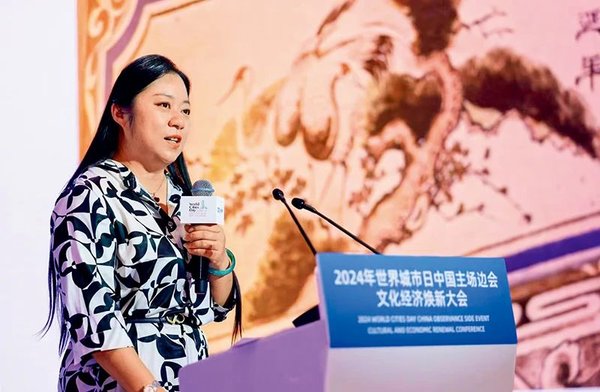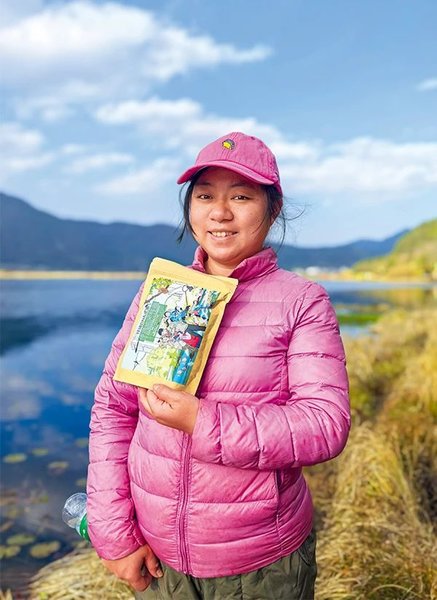Researcher Leads Advancement of Urban Biodiversity Conservation

Li Weiwei is a researcher with Kunming Institute of Zoology, which is affiliated with the Chinese Academy of Sciences. Li is also head of an international research center, focusing on urban biodiversity conservation, based in southwest China's Yunnan Province. In 2020, Li was named a national-level advanced worker in science popularization. She has promoted China's good practices in urban biodiversity conservation during many international conferences and exchanges, including the United Nations Biodiversity Conference (COP 15).
Throughout the years, she has led her team in scientific research and organizing activities to introduce their research outcomes to the public, and during that time Li has come to realize women can do a good job in science popularization.
"I am a scientific worker. Meanwhile, I am the mother of my twin sons. Every time I organize and/or participate in an event to popularize science-related knowledge, I notice there are mothers among the attendees. As a mother, I communicate with my audiences easily. I know the importance of transforming complicated and abstract terms into vivid, interesting and easy-to-understand expressions, especially if we want to promote scientific knowledge efficiently to the public," Li said in a recent interview with Women of China.
When she organizes an event, Li always carefully checks all details, to ensure scientific knowledge will be introduced to the audience correctly, and precisely. She does her best to help provide high-quality science popularization to the public.

"Stereotypes, such as science is a 'male-dominated' field, still exist in society today. But I believe, if women scientific workers play active roles in science popularization, more and more people, especially women, children, and their families, will realize women can make achievements as well as men in the development of science and technology," Li says.
She often shares stories about outstanding women scientists with young girls. She also shares her own experiences in scientific research with the girls. "I tell them how I have solved various problems. I hope to inspire more girls to face challenges and difficulties bravely, so they will be determined to pursue their goals in scientific research," Li says.
Li and her teammates have worked with Cuihu Park, in Kunming, capital of Yunnan Province, since 2019. Li's team has created a floating bird island, which has provided roosting habitats for herons and other aquatic birds. The initiative was expanded in 2024, when a nocturnal island was added to create habitation for forest birds.

In a news report, published online by Xinhua in November 2024, about the bird islands in Cuihu Park, Li mentioned more measures will be implemented to create micro-habitats for birds in different ecological environments. The protection of birds cannot rely solely on the efforts of scientists, she added. "The raising of public awareness, and the involvement of all citizens in biodiversity conservation are required," Li noted.
Li's team has worked with young researchers, from home and abroad, to protect the ecological environment, to popularize science education, and to promote culture in urban areas. "We hope to engage the public in joining our efforts for biodiversity conservation," she says.
Li is pleased and proud, because her team's efforts have resulted in the increase of bird species in Cuihu Park, from 25 (around four years ago) to nearly 100 currently. "Public awareness is key to biodiversity conservation. By involving citizens and tourists in the improvement of the ecological environment, and in scientific research and education, we will foster the public's understanding of the urgency of protecting the ecosystem of a city," Li explains.
In addition to sharing her ideas about biodiversity conservation and ecological protection with other scientists, experts and the public, Li pays special attention to the scientific education she provides her children. When Li was a girl, her parents took her on trips through Yunnan Province, so she could learn about the region's landscapes. Now, as a mother of two sons, Li attaches importance to the natural-science education she gives her children.
Since 2024, Li has spent most of her holidays traveling with her sons. She has taken them to the countryside, mountains and wetlands of Yunnan, to help them understand how fast-developing modern techniques can be utilized in the protection of the ecological environment. They have also visited several cities in central China's Henan Province, where Li has taught her children how the progress of science, culture, agricultural production and transportation has positively affected the advancement of civilization.
Photos from Interviewee
(Women of China English Monthly March 2025)
Editor: Wang Shasha
Please understand that womenofchina.cn,a non-profit, information-communication website, cannot reach every writer before using articles and images. For copyright issues, please contact us by emailing: website@womenofchina.cn. The articles published and opinions expressed on this website represent the opinions of writers and are not necessarily shared by womenofchina.cn.








.jpg)

 WeChat
WeChat Weibo
Weibo 京公网安备 11010102004314号
京公网安备 11010102004314号